Most people gain some weight as they get older. A combination of factors like heredity, hormonal changes, a slowing metabolism, declining muscle mass, and a more sedentary lifestyle can contribute to weight gain over the years, making it harder to shed those extra pounds.
But how much weight gain is too much?
The first step to finding your ideal body weight is to manage your expectations. Don’t get discouraged if you can’t fit into your old high school jeans. It’s simply not realistic to judge your current body by the standards you set for yourself as a teenager!
Next, try to understand why you gained weight in the first place. While poor eating habits and insufficient exercise are common culprits, other factors often play a role:
Factors Contributing to Weight Gain:
- Heredity: Genetics can influence your weight distribution. If your family members tend to gain abdominal weight, you might struggle with stubborn belly fat too.
- Pregnancy: Many women find it challenging to return to their pre-pregnancy weight, and may become discouraged by newfound belly fat, which can be difficult to address through diet and exercise alone.
- Hormones:
- Women: Women often experience increased body fat in the years leading up to menopause, sometimes gaining about 1 pound per year. Weight gain can continue during menopause, possibly due to declining estrogen levels. While menopause-related weight gain isn’t inevitable, it requires extra effort to avoid. After menopause, most women can maintain their weight on 1,500 to 1,600 calories a day, according to the Mayo Clinic.
- Men: A gradual decline in testosterone levels can contribute to increased body fat and decreased lean muscle mass in men.
- Metabolism: Aging brings a decreased metabolic rate. You simply don’t burn calories as efficiently as you once did, so it takes more physical activity to achieve similar results.
While you may not fit into those old, faded Levi’s again, you can certainly aspire to a size that’s healthy for you *now*. A healthy weight is not only attainable but also maintainable through healthy eating habits and regular physical activity.
A healthy weight will be different for everybody. Some may have already achieved their healthy weight without realizing it.
If you’re happy with how your clothes fit, and you’re healthy and able to do the things you enjoy—whether it’s exercising or keeping up with your kids—then you’ve probably found the weight that’s right for you.
One obstacle to finding and maintaining a healthy weight is a trap known as “false-hope syndrome.” This occurs when you set yourself up for failure by having unrealistic expectations, explains Bowman. Setting unattainable goals, like wanting to lose too much weight too quickly, can lead to a cycle of weight gain and loss.
A Better Approach:
Think about your lowest and highest adult weights. Unless you’ve always struggled with being overweight, your healthy weight is likely to be somewhere in the middle of these two, and one you can maintain long-term.
If you’ve consistently struggled with weight issues, it’s advisable to consult your doctor or a registered dietitian to determine a healthy weight range for you.
Reaching a healthy weight may involve increasing your physical activity, incorporating resistance training to build lean muscle mass, and consuming fewer calories or less fat. If you’ve been inactive for a long time, or if you have any health concerns, check with your doctor before starting a new exercise program.
Source: Livebetteramerica.com





